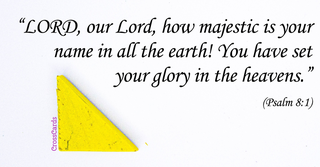
Change Translation
- Recent Translations
- All Translations
Images for Psalm 8:5


Share
Psalm 8:5 Meaning and Commentary
For thou hast made him a little lower than the angels
Than Elohim, "than God", as this word usually signifies: and could it be interpreted of man, as made by God, it might be thought to refer to the creation of him in the image and likeness of God; but as it must be understood of the human nature of Christ, it may regard the wonderful union of it to the Son of God, on account of which it is called by the same name, ( Luke 1:35 ) ; and so made but a little lower than God, being next unto him, and in so near an union with a divine Person; and which union is hypostatical or personal, the human nature being taken into a personal union with the Son of God: and so these words give an instance of God's marvellous regard to it; and contain a reason, proving that he has been mindful of it, and visited it. Though rather this clause refers to the humiliation of Christ in his human nature, as it is interpreted in ( Hebrews 2:9 ) ; and so it removes an objection, as it is connected with the following clause, which might be made against what had been observed in ( Psalms 8:4 ) , on account of the low estate of Christ's human nature, when here on the earth; and the sense is, that God has been mindful of it, and visited it, notwithstanding its state of humiliation for a little while, seeing he has crowned it with glory and honour Christ was made low as to nature, place, estate, reputation, and life; he who was the most high God, in the form of God, and equal to him in the divine nature, was made frail mortal flesh, and was in the form of a servant in the human nature. He who dwelt on high, and lay in the bosom of his Father, descended into the lower parts of the earth, was formed in the womb of a virgin, and when born was laid in a manager, and dwelt and conversed with sinful mortal men upon earth: he who was Lord of all, whose is the earth, and the fulness of it, had not where to lay his head: he whose glory was the glory of the only begotten of the Father, became a worm and no man in the esteem of men, was despised and rejected of men, and was of no reputation: and he who was the Lord of life and glory was crucified and killed; becoming obedient to death, even the death of the cross. Such is the nature of Christ's humiliation, expressed by being "made low"; the degree of it is, "lower than Elohim", than God: he was equal to him in the divine nature, but inferior to him in the human nature, ( John 14:28 ) . As Mediator he was the servant of God, and the servant is not greater than his master; nor as such so great: and he was in his low estate in such a condition as to need the help and assistance of God, which he had in the day of salvation: and especially he was lower when he, was deserted by him, ( Matthew 27:46 ) . Agreeably to which, some render the words, as they will bear to be rendered, "thou didst make him want God", or "didst deprive", or "bereave him of God" F9; that is, of the gracious presence of God: and so Christ was made lower than God in nature, office, and condition. Sometimes the word "Elohim" is used for civil magistrates, as in ( Psalms 82:6 ) ; because they are in God's stead, and represent him; and, on account of their majesty, authority, and power, bear some resemblance to him. Now Christ was made lower than they, inasmuch as he not only taught obedience to them, but obeyed them himself, was a servant of rulers, paid tribute to them, and suffered himself to be examined, tried, judged, and condemned by them; but since the word is rendered "angels" by the Chaldee paraphrase, the Septuagint interpreters, the Jewish commentators, Aben Ezra, Jarchi, Kimchi, and Ben Melech, and in the Arabic, Syriac, and Ethiopic versions, and above all by the author of the epistle to the Hebrews, it is best to interpret it of them: and Christ was made lower than they by assuming human nature, which is inferior to theirs, especially in the corporeal part of it; and more so, inasmuch as it was attended with infirmities, and subject to sorrows and griefs; and as it was sometimes reduced to great extremes, and to want the comforts of life; and sometimes was in such distress as to need the assistance and ministration of angels, which it had, ( Matthew 4:11 ) ( Luke 22:43 ) ; and particularly it was lower than they when deserted by God, whose face they always behold. To which may be added, that Christ was made under, a law given by the disposition of angels, ordained by them, and is called "the word" spoken by them; some parts of which they are not subject to; but the particular instance the apostle observes is suffering of death, ( Hebrews 2:9 ) ; which angels are not liable to, they die not. The duration of this low estate was "a little while"; for so the Hebrew word (jem) may be rendered, as it is in ( Psalms 37:10 ) , and the Greek (bracu ti) , used by the Septuagint, and the author of the epistle to the Hebrews, as it is in ( Acts 5:34 ) ; which refers either to the time of suffering death, and lying under the power of that and the grave, which was but a little time; or at most to the days of his flesh, reaching from his incarnation to his resurrection; which was a course but of a few years, and may very well be expressed in this manner. And to this low estate was Christ brought by Jehovah the Father, who is the person spoken of throughout the psalm; he preordained him to it, prepared a body for him, sent him in the fulness of time, made of a woman, made under the law, and had a very great hand in his sufferings and death: though all was with Christ's full consent, and with his free good will;
and hast crowned him with glory and honour;
by raising him from the dead, and setting him at his own right hand, committing all judgment to him; and requiring all creatures, angels and men, to give worship and adoration to him. And this being in consequence of his sufferings, after he had run the race, and endured a fight of afflictions; and because of the greatness of his glory and honour, with which he was as it were on all sides surrounded, he is said to be "crowned" with it; who a little before was crowned with thorns, and encompassed with the terrors of death and hell. This respects his mediatorial glory.
F9 (Myhlam-whroxt) "et deficere facies" ("vel facisti", Pagninus) "eum paululum a Deo", Montanus; "destitui quidem eum voluisti paululum a Deo", Michaelis; "carere eum fecisti Deo parumper", Gejerus.
Psalm 8:5 In-Context
Study Tools
PLUSUnlock Notes
This feature is for PLUS subscribers only. Join PLUS today to access these tools and more.
JOIN PLUSUnlock Highlights
This feature is for PLUS subscribers only. Join PLUS today to access these tools and more.
JOIN PLUSUnlock Bookmarks
This feature is for PLUS subscribers only. Join PLUS today to access these tools and more.
JOIN PLUSTrack Your Reading
Create a free account to start a reading plan, or join PLUS to unlock our full suite of premium study tools.